人教八年级下Unit 5 What were you doing when the rainstorm came?复习课件(45张PPT)
文档属性
| 名称 | 人教八年级下Unit 5 What were you doing when the rainstorm came?复习课件(45张PPT) | 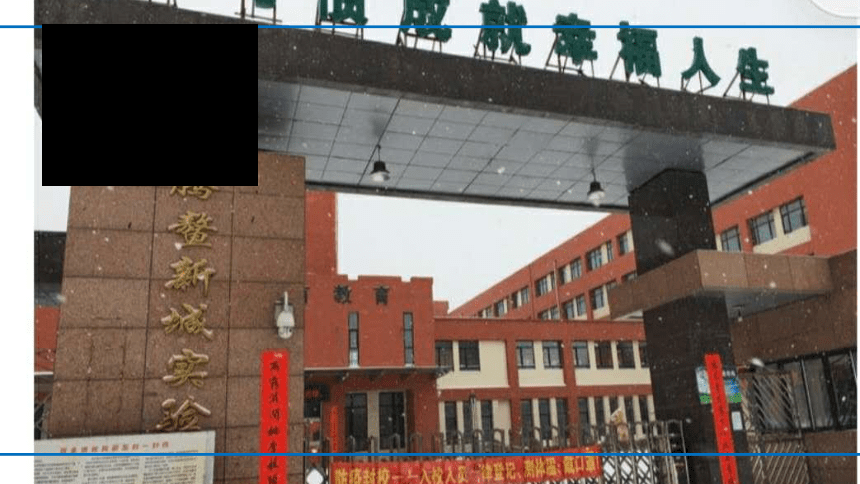 | |
| 格式 | pptx | ||
| 文件大小 | 12.9MB | ||
| 资源类型 | 教案 | ||
| 版本资源 | 人教新目标(Go for it)版 | ||
| 科目 | 英语 | ||
| 更新时间 | 2021-05-01 11:06:53 | ||
图片预览

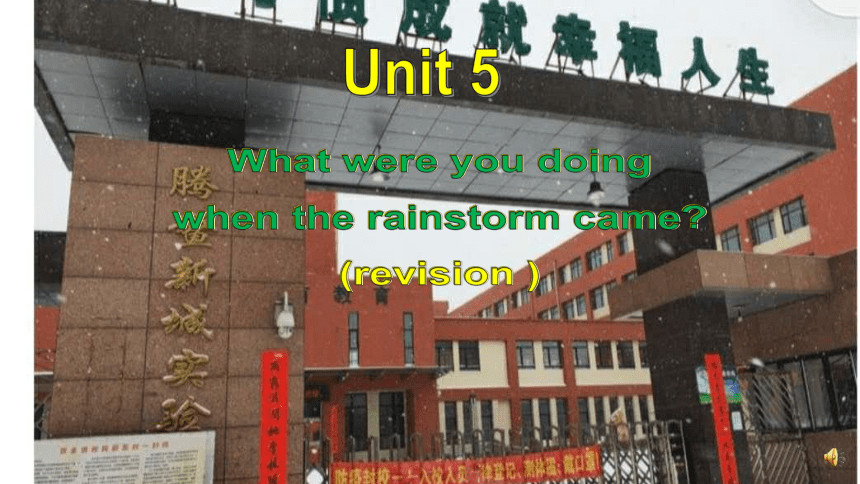
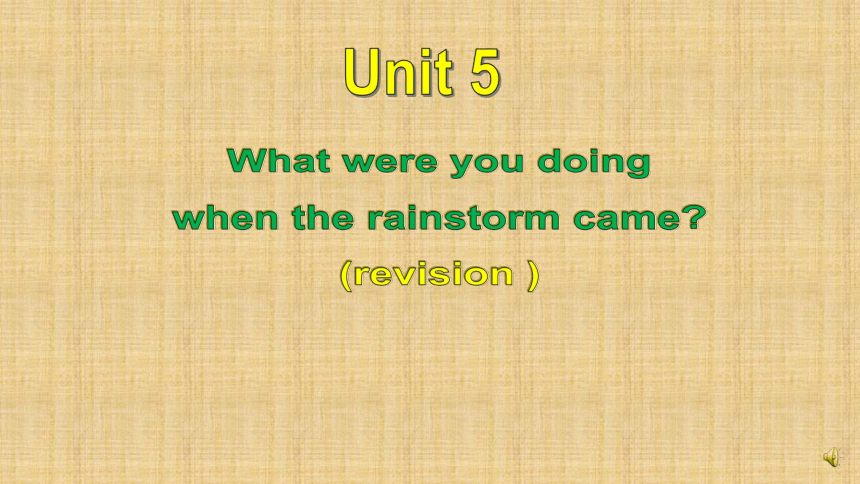

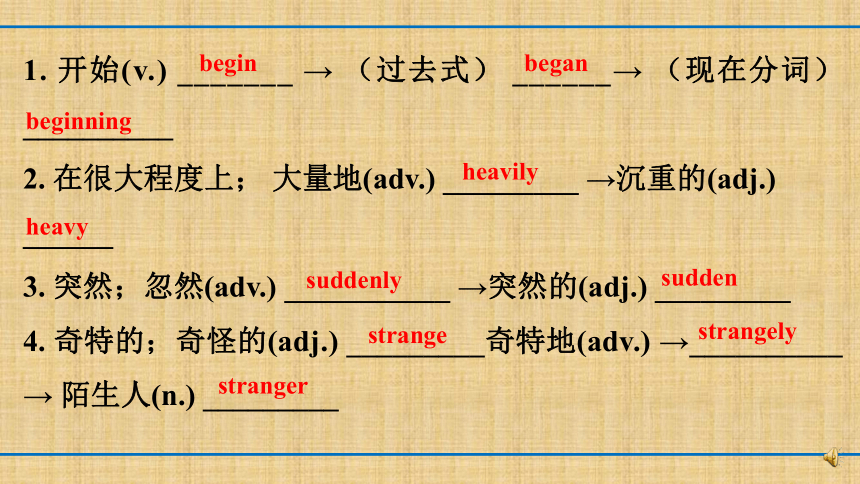
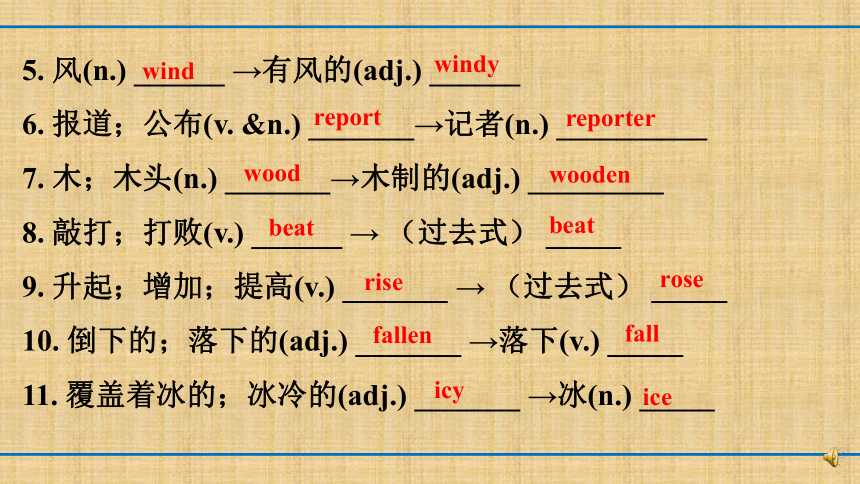
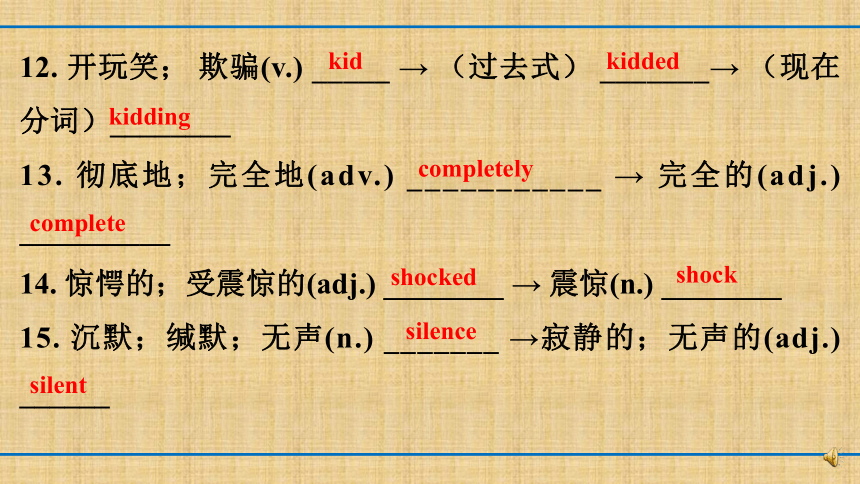
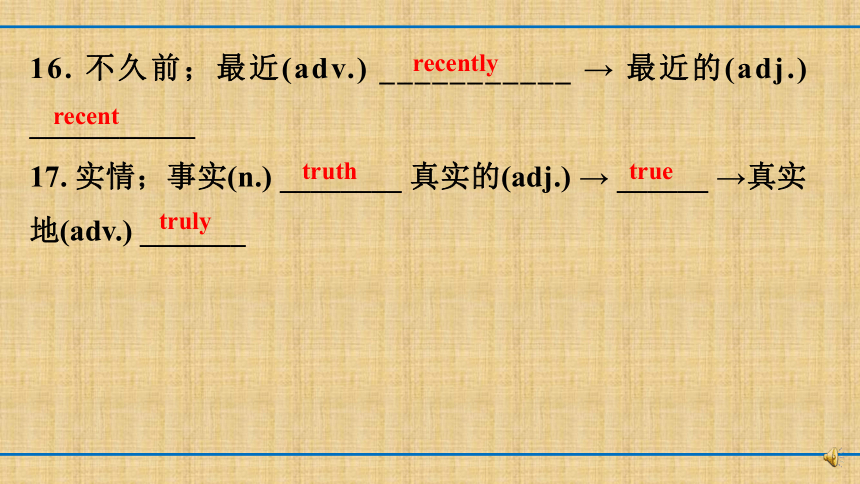

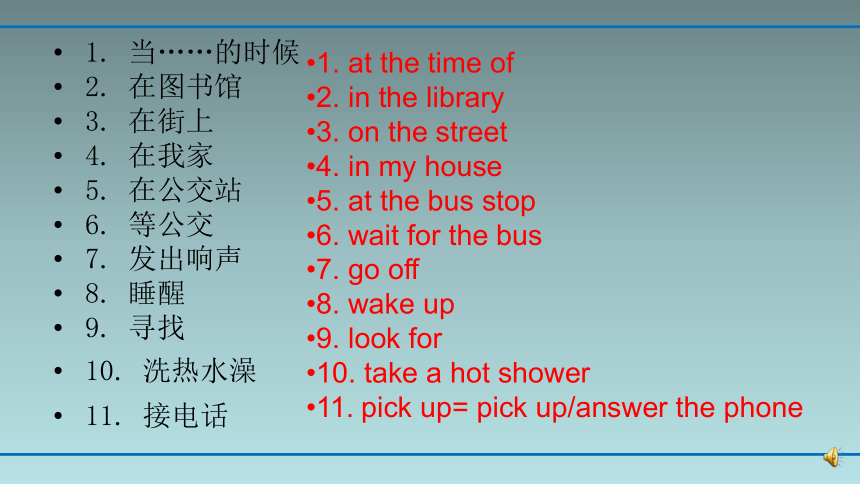
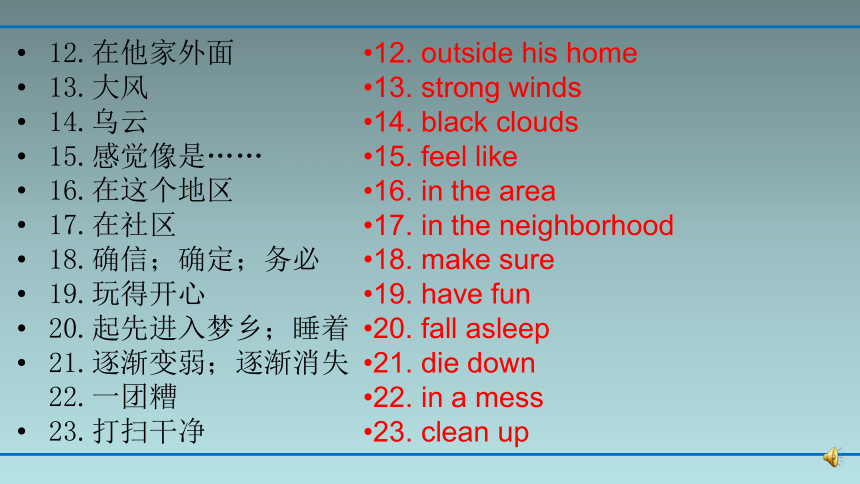
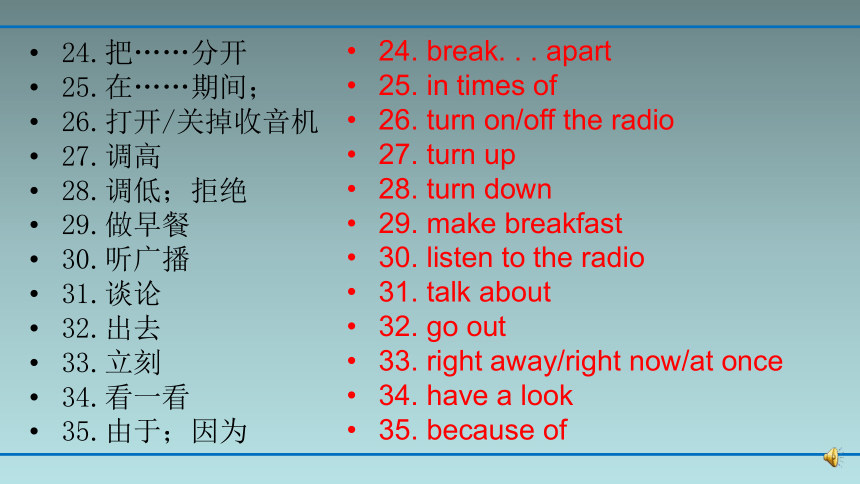
文档简介
Unit 5
What were you doing
when the rainstorm came?
(revision )
Unit 5
What were you doing
when the rainstorm came?
(revision )
词性变化
1. 开始(v.) _______ → (过去式) ______→ (现在分词)__________
2. 在很大程度上; 大量地(adv.) _________ →沉重的(adj.)
______
3. 突然;忽然(adv.) ___________ →突然的(adj.) _________
4. 奇特的;奇怪的(adj.) _________奇特地(adv.) →__________ → 陌生人(n.) _________
began
begin
beginning
heavily
heavy
suddenly
sudden
strange
strangely
stranger
5. 风(n.) ______ →有风的(adj.) ______
6. 报道;公布(v. &n.) _______→记者(n.) __________
7. 木;木头(n.) _______→木制的(adj.) _________
8. 敲打;打败(v.) ______ → (过去式) _____
9. 升起;增加;提高(v.) _______ → (过去式) _____
10. 倒下的;落下的(adj.) _______ →落下(v.) _____
11. 覆盖着冰的;冰冷的(adj.) _______ →冰(n.) _____
wind
windy
report
reporter
wood
wooden
beat
beat
rise
rose
fallen
fall
icy
ice
12. 开玩笑; 欺骗(v.) _____ → (过去式) _______→ (现在分词)________
13. 彻底地;完全地(adv.) ___________ → 完全的(adj.) __________
14. 惊愕的;受震惊的(adj.) ________ → 震惊(n.) ________
15. 沉默;缄默;无声(n.) _______ →寂静的;无声的(adj.) ______
kid
kidded
kidding
completely
complete
shocked
shock
silence
silent
16. 不久前;最近(adv.) ___________ → 最近的(adj.) ___________
17. 实情;事实(n.) ________ 真实的(adj.) → ______ →真实地(adv.) _______
recently
recent
truth
true
truly
重点短语
1. 当……的时候
2. 在图书馆
3. 在街上
4. 在我家
5. 在公交站
6. 等公交
7. 发出响声
8. 睡醒
9. 寻找
10. 洗热水澡
11. 接电话
1. at the time of
2. in the library
3. on the street
4. in my house
5. at the bus stop
6. wait for the bus
7. go off
8. wake up
9. look for
10. take a hot shower
11. pick up= pick up/answer the phone
12.在他家外面
13.大风
14.乌云
15.感觉像是……
16.在这个地区
17.在社区
18.确信;确定;务必
19.玩得开心
20.起先进入梦乡;睡着
21.逐渐变弱;逐渐消失22.一团糟
23.打扫干净
12. outside his home
13. strong winds
14. black clouds
15. feel like
16. in the area
17. in the neighborhood
18. make sure
19. have fun
20. fall asleep
21. die down
22. in a mess
23. clean up
24. break. . . apart
25. in times of
26. turn on/off the radio
27. turn up
28. turn down
29. make breakfast
30. listen to the radio
31. talk about
32. go out
33. right away/right now/at once
34. have a look
35. because of
24.把……分开
25.在……期间;
26.打开/关掉收音机
27.调高
28.调低;拒绝
29.做早餐
30.听广播
31.谈论
32.出去
33.立刻
34.看一看
35.由于;因为
36.在路边
37.到达公交站
38.动物保护热线
39.等待
40.走路经过
41.难怪
42.跑回家
43.校园篮球比赛
44.比赛的时候
45.如此多次
36. by the side of the road
37. get to the bus stop
38. the Animal Helpline
39. wait for
40. walk by
41. no wonder
42. run back home
43. school basketball competition
44. at the time of competition
45. so many times
46.把手机落在家
47.前往
48.顺便说一下
49.迷路
50.用这种方法
51.在去...的路上
52.历史上的重大事件
53.在美国
54.例如
55.被杀害
46. leave my phone at home
47. make one's way to ...
48. by the way
49. lose one's way
50. in this way
51. on one's way to...
52. important events in history
53. in America
54. for example
55. be killed
56.50多(岁)
57.一个小学生
58.在那个时候
59.在厨房
60.通过广播
61.对...感到震惊
62.对做某事感到震惊
63.在那之后
64.剩余的...
65.沉默;无声
66.最近地
56. over 50
57. a school pupil
58. at that time
59. in the kitchen
60. on the radio
61. be shocked at
62. be shocked to do sth.
63. after that
64. the rest of...
65. in silence
66. more recently
67.世贸中心
68.拆除;摧毁
69.对……有意义
70.记得做过某事
71.首先;最初
72.向窗外看
73.如此...以至于
74.讲事实
75.做某事有困难
76.指出
77.离开
67. the World Trade Center
68.take down
69. have meaning to
70. remember doing sth.
71. at first
72. look out of the window
73. so...that
74. tell the truth
74. have trouble/problems/difficulty in doing sth.
76. point out
77. go away
词汇应用
The news on TV reported that there was a rainstorm in the area.
He had a fight with his best friend, and they walked home in silence.
He got up late this morning, because his alarm didn’t go off.
The movie was so boring that I fell asleep half way through it.
Our team beat other teams in the soccer game and won the first place yesterday.
Terrorists took down the World Trade Center in New York in 2001.
7. She was walking along the road when a car suddenly hit a tall tree.
8. It's autumn. There are fallen leaves everywhere on the ground.
9. —What's the date today? —It's March 31st.
10. There is one passage from the newspaper. Tell me the main idea of it after you finish reading.
11. We all know that the sun rises in the east and sets in the west.
12. At first my mother didn't allow me to go shopping, but later she changed her mind.
13. Oh! My sweater is on the floor. Please pick it up for me.
14. “The fire is dying down. Please get more wood, ” Pierre shouted.
知识点拨
1.What were you doing yesterday at the time of the rainstorm? (P. 33-主题图)
(1)此句是过去进行时的特殊疑问句。过去进行时表示在过去某一时刻或某个时间段内正在进行的动作,谓语动词由“was/were+动词的现在分词”构成。
(2)at the time of 意为“在……的时候”Eg:at the time of lunch
2.My alarm didn’t go off so I woke up late. (P. 34-2a)
(1) go off意为“(闹钟)发出响声”。
(2) go off: 其他含义:离开;He went off yesterday.
(食物等)变质;Meat goes off easily in summer.
(电灯)熄灭,断电;The light went off suddenly.
(3)wake的过去式是woke, wake up 醒来
3. I was waiting for the bus when it began to rain heavily.(P. 34-2a)
(1)begin动词, 意为“开始”,其后既可接动词不定式, 也可接动词?ing形式, 意为“开始做某事”。begin to do sth.=begin doing sth.
(2)heavily副词,意为“在很大程度上,大量地”,常用来表示雨、雪下得大,相当于hard。形容词形式为heavy
(重庆中考)It rained _ _ yesterday. I had to stay at home and watch TV.
A. heavily B. quietly C. hardly D. quickly
(3)wait for 等待
Wait for sb./sth.
A
4. I was so busy looking for the umbrella that I didn't see a car coming. (P. 34-2a)
(1)so...that 如此...以至于 ;so that 以便;为了=in order that= in order to do sth.
(2)be busy doing sth. =be busy with sth.忙于做……
e.g. She is busy playing computer games.
She is busy with computer games.
(3)look for ……寻找……
(4)see sb. doing sth. 看见某人正在干某事
see sb. do sth. 看见某人干某事(全过程)
5. I took a hot shower and ate some warm food. (P. 34-2a)
take 的过去式是took
6. I ran to the bus stop but I still missed the bus.
run的过去式是ran; miss 的意思是错过;思念
7. So, when the rainstorm suddenly came, what were you doing? (P. 34-2c)
suddenly 副词,意为“突然,忽然”,可放在句首句中或句尾。其形容词形式为sudden,意为“突然的”。
When he was walking on the street, a snake _ _ _ (sudden) appeared.
suddenly
8. I called at seven and you didn’t pick up. (P. 34-2d)
(1)pick up此处意为“接电话;接收到(信号或声音)”相当于pick up/answer the phone
(2)pick up还可以表示“捡起;(开车)接人;偶然学会”
(3)pick up为“动词+副词”型短语,代词做宾语放pick与up中间。
eg. pick it up
9. I called again at eight and you didn’t answer then either. (P. 34-2d)
also, too, as well与either都可以表示“也”,但是用法不同。
{5C22544A-7EE6-4342-B048-85BDC9FD1C3A}also
放在句中,行为动词前,be动词、助动词和情态动词之后。
He also wants to go.
too
用于肯定句中,放在句尾,前面用逗号隔开。
He wants to go, too.
as well
用于肯定句中,放在句尾,前面不用逗号隔开。
He wants to go as well.
either
用于否定句句末。
He doesn’t want to go either.
10. With no light outside, it felt like midnight. (P. 35-3a)
(1)with no light outside是介词短语,在句中作原因状语,表示伴随的情况。
那个男孩手里拿着苹果跑了进来。
The boy ran in, with an apple in his hand.
(2)light 在这里作不可数名词,意为“光,光亮”。
light的其他意思有:n. “电灯”,为可数名词;two lights
adj. “轻的”;“浅色的” “明亮的”;light blue;
v. “点燃”。light the candle
(3)feel like感觉像……
【拓展】feel like还可意为“想要”,后常接动词?ing形式,意为“想要做某事”。feel like doing sth.意为“想要做某事”。相当于want to do sth. =would like to do sth.
(福建中考) I have a cold. So I don’t feel like _________ (eat) anything.
eating
11. Ben’s dad was putting pieces of wood over the windows while his mom was making sure the flashlights and radio were working. (P. 35-3a)
(1)wood在此是不可数名词,意为“木头”。a piece of wood 意为“一块木头”。
e.g. The desks and chairs are made of _____ (wood).
(2)make sure意为“确保;确定;务必”,后接不定式to ,of短语或者that从句。
e.g. Make sure to come on time.
I tried to make sure of the problem.
Make sure that he will come tomorrow.
wood
12. He finally fell asleep when the wind was dying down at around 3:00 a.m. (P. 35-3a)
(1)fall asleep意为“睡着;进入梦乡”,其中asleep为形容词,意为“睡着的”
(2)die down意为“逐渐变弱、逐渐消失”。
The wind finally died down.
13. Ben was helping his mom make dinner when the rain began to beat heavily against
the windows. (P. 35-3a)
(1) beat表示“敲打”, 也可以表示“战胜、打败”,宾语是竞争对手。
They beat drums to cheer up the players./I beat her at swimming yesterday.
(2) against用作介词,表示“碰、撞”。
The rain beat heavily against the windows.
14. When he woke up, the sun was rising. (P. 35-3a)
(1) wake sb. up意为“把某人唤醒”,wake up意为“醒来”。
His mother often wakes him up at 6:00 in the morning.
I usually wake up at 6:30.
(2) rise(rose, risen, rising)不及物动词,意为“升起,上升”
辨析:rise与raise
{5C22544A-7EE6-4342-B048-85BDC9FD1C3A}rise
不及物动词
意为“升起,上升”
The sun rises in the east and sets in the west.
raise
及物动词
意为“提高,筹集,抬高,举起”,主语通常是人。
The workers want the boss to raise their wages
The teacher asks us to raise our hands if we have questions.
We should try our best to raise more money for the poor family.
15. Although the storm broke many things apart, it brought families and neighbors closer together. (P. 35-3a)
break...apart意为“把……折断;把……分开”。
其过去式是broke,broken是形容词,“破碎的,坏掉的”。
Bob _ _ _the windows just now and the _ _ _windows were everywhere. (break)
broke
broken
16. Kate realized her bag was still at home. (P. 37-1c)
realize用作及物动词,意为“理解、领会、意识到”,后接名词、代词或者从句作宾语。
He didn’t realize his mistake.
The man laughed when he realized what happened.
17. When the school basketball competition started, Kate was still making her way to school. (P. 37-1d)
make one’s way to意为“前往……,费力地前进”,后接表示地点的名词,强调克服重重困难,想方设法去某地。
We slowly made our way to the mall through the crowd.
18. On this day,Dr. Martin Luther King was killed. (P. 38-2b)
was killed意为“被杀害”表示的是被动关系。英语语法上将这种现象称为“被动语态” 。
19. My parents were completely shocked. (P. 38-2b)
(1)completely副词,意为“彻底地;完全地”。
(2) shocked 感到震惊的
shocking 令人震惊的
20. My parents did not talk after that, and we finished the rest of our dinner in silence. (P. 38-2b)
rest此处表示“其余的部分”,the rest of意为“其余的……、其它的……”,作主语时,谓语动词的数要与the rest of 修饰的名词或代词的数保持一致。
The rest of the money is on the desk.
Some of the students are reading in the classroom and the rest of them are on the playground.
in silence意为“沉默、无声”。
She stood by the window in silence for a long time.
21. More recently, most Americans remember what they were doing when the World Trade Center in New York was taken down by terrorists. (P. 38-2b)
recently用作副词,意为“近来、最近”,常与一般过去时和现在完成时连用。
Have you called your mother recently?
(2) remember doing sth. 记得做过某事
remember to do sth. 记得要做某事
(3)take down意为“拆除、拆掉”,还可以表示“写下、记下”。
Could you please help me take down this tent?
I forgot to take down his telephone number.
22. Kate didn’t think her friend was telling the truth about the event. (P. 39-2c)
truth用作名词,表示“实情、事实”,to tell the truth表示“说实话”,放在句中作插入语,用逗号同句子其它成分隔开。
Eg:To tell the truth,I don’t really like this dress.
23. I had trouble thinking clearly after that because I was very afraid. (P. 39-2d)
have trouble (in)doing sth.表示“做某事有困难”,相当于have difficulty/problems(in)doing sth.
翻译句子
1. 雾正在渐渐消退。(fog, die down)
The fog is dying down.
2. 今天好冷,我感觉像要感冒了。(feel like, catch a cold)
It’s very cold today, and I feel like catching a cold.
3.确保一切准备就绪。(make sure, be ready)
Make sure that everything is ready.
4.凯特看见一位老人坐在路边。(see sb. doing, by the side of)
Kate saw an old man sitting by the side of the road.
5.那位老人正费力地走向门口。(make one’s way to)
The old man is making his way to the door.
6.迈克现在很难思考这个问题, 因为他太紧张了。
(have trouble doing, nervous)
Now Mike has trouble thinking about the question because he is much too nervous.
单元语法
?定义:表示在过去某一时刻或某一段时间内正在进行的动作。
?构成:
was/were+动词?ing形式(第一人称单数和第三人称单数用was,其余用were)
?句型结构
肯定句:主语+was/were+动词?ing形式+其他.
否定句:主语+was/were+not+动词?ing形式+其他.
一般疑问句:Was/Were+主语+动词?ing形式+其他?
回答:Yes,主语+was/were;No,主语+wasn't/weren't.
过去进行时
?常用的时间状语
at that time,this time yesterday,at the time of...,when/while引导的时间状语从句等。
?与一般过去时的区别
过去进行时表示在过去某一时刻或某段时间内发生的动作,强调动作正在进行;一般过去时表示过去发生的动作,多侧重于动作已经完成。
When与While引导的时间状语从句
?1. 由when引导的时间状语从句,主句用过去进行时,从句应用一般过去时;
由while引导的时间状语从句,主句用一般过去时,从句应用过去进行时。
When the teacher came in, we were talking.
当此句改变主从句的位置时,则为:
While we were talking, the teacher came in.
?2.如果从句和主句的动作同时发生,两句都用过去进行时的时候,多用while引导。如:
While I was playing the piano,she was dancing.
语篇填空
An Unforgettable Day
One day, Bill went to the beach with his friends Jim and Bob. After playing for a while, Bill was so tired that he fell asleep on the comfortable beach. When he woke up, his friends were playing volleyball. Bill walked towards them and began to play with them.
Bob beat the ball too heavily and it fell into the sea. When Bob was going to pick up the ball, a strong wind blew it away. Bill wanted to show off (炫耀) his swimming skills, so he decided to get the ball back for them.
After swimming for about ten minutes, Bill became tired. He realized it was impossible for him to get the ball. At that moment, some black clouds appeared in the sky!Oh, what strange weather it was!It started to rain heavily.
At first, Jim and Bob were laughing at Bill. Then, they were completely shocked because they couldn't see Bill. They stood on the beach in silence, and Bill never came back.
After doing sth.
It is +adj. for to do sth.
补全对话
A:Hey, Jill. Were you at home at seven last night?
B:Yes, I was.
A:What were you doing?
B:I was doing my homework. Where were you at that time?
A:I was riding the bike in the park.
B:Did you have fun?
A:Yes, of course. Guess!What did I see?
B:I've no idea.
A:I saw an alien (外星人).
B:Really?What happened next?
A:He invited me to have dinner.
B:Haha. . . You are telling me a story, right?
A:No, no, no!It's true.
Composition
{作文讲与练}
作文话题
某英文报社正在举办以“An Unforgettable Experience”为题的征文活动,请根据下列提示投稿,讲述一下自己最难忘的经历。
提示:
When did it happen?
Where did it happen?
What were you doing?
What were the others doing?
Why was it important?
要求:
1.词数:80左右;
2.书写工整,句式规范,条理清楚,标点符号使用正确。
思路点拨
An Unforgettable Experience
On October 1st,2019 , I planned to take the bus to the train station. When I was waiting for the bus at the bus stop , it began to rain suddenly. Unluckily ,I forgot to take my umbrella .I stood in the rain , with the rain beating heavily against my body . Just at that time ,a car stopped and the driver offered to take me to the train station . I was so moved that I’ll never forget this experience. I am always ready to help others like that driver from then on .
范文
homework
1.整理笔记
2.做好本单元复习,准备考试.
thanks
What were you doing
when the rainstorm came?
(revision )
Unit 5
What were you doing
when the rainstorm came?
(revision )
词性变化
1. 开始(v.) _______ → (过去式) ______→ (现在分词)__________
2. 在很大程度上; 大量地(adv.) _________ →沉重的(adj.)
______
3. 突然;忽然(adv.) ___________ →突然的(adj.) _________
4. 奇特的;奇怪的(adj.) _________奇特地(adv.) →__________ → 陌生人(n.) _________
began
begin
beginning
heavily
heavy
suddenly
sudden
strange
strangely
stranger
5. 风(n.) ______ →有风的(adj.) ______
6. 报道;公布(v. &n.) _______→记者(n.) __________
7. 木;木头(n.) _______→木制的(adj.) _________
8. 敲打;打败(v.) ______ → (过去式) _____
9. 升起;增加;提高(v.) _______ → (过去式) _____
10. 倒下的;落下的(adj.) _______ →落下(v.) _____
11. 覆盖着冰的;冰冷的(adj.) _______ →冰(n.) _____
wind
windy
report
reporter
wood
wooden
beat
beat
rise
rose
fallen
fall
icy
ice
12. 开玩笑; 欺骗(v.) _____ → (过去式) _______→ (现在分词)________
13. 彻底地;完全地(adv.) ___________ → 完全的(adj.) __________
14. 惊愕的;受震惊的(adj.) ________ → 震惊(n.) ________
15. 沉默;缄默;无声(n.) _______ →寂静的;无声的(adj.) ______
kid
kidded
kidding
completely
complete
shocked
shock
silence
silent
16. 不久前;最近(adv.) ___________ → 最近的(adj.) ___________
17. 实情;事实(n.) ________ 真实的(adj.) → ______ →真实地(adv.) _______
recently
recent
truth
true
truly
重点短语
1. 当……的时候
2. 在图书馆
3. 在街上
4. 在我家
5. 在公交站
6. 等公交
7. 发出响声
8. 睡醒
9. 寻找
10. 洗热水澡
11. 接电话
1. at the time of
2. in the library
3. on the street
4. in my house
5. at the bus stop
6. wait for the bus
7. go off
8. wake up
9. look for
10. take a hot shower
11. pick up= pick up/answer the phone
12.在他家外面
13.大风
14.乌云
15.感觉像是……
16.在这个地区
17.在社区
18.确信;确定;务必
19.玩得开心
20.起先进入梦乡;睡着
21.逐渐变弱;逐渐消失22.一团糟
23.打扫干净
12. outside his home
13. strong winds
14. black clouds
15. feel like
16. in the area
17. in the neighborhood
18. make sure
19. have fun
20. fall asleep
21. die down
22. in a mess
23. clean up
24. break. . . apart
25. in times of
26. turn on/off the radio
27. turn up
28. turn down
29. make breakfast
30. listen to the radio
31. talk about
32. go out
33. right away/right now/at once
34. have a look
35. because of
24.把……分开
25.在……期间;
26.打开/关掉收音机
27.调高
28.调低;拒绝
29.做早餐
30.听广播
31.谈论
32.出去
33.立刻
34.看一看
35.由于;因为
36.在路边
37.到达公交站
38.动物保护热线
39.等待
40.走路经过
41.难怪
42.跑回家
43.校园篮球比赛
44.比赛的时候
45.如此多次
36. by the side of the road
37. get to the bus stop
38. the Animal Helpline
39. wait for
40. walk by
41. no wonder
42. run back home
43. school basketball competition
44. at the time of competition
45. so many times
46.把手机落在家
47.前往
48.顺便说一下
49.迷路
50.用这种方法
51.在去...的路上
52.历史上的重大事件
53.在美国
54.例如
55.被杀害
46. leave my phone at home
47. make one's way to ...
48. by the way
49. lose one's way
50. in this way
51. on one's way to...
52. important events in history
53. in America
54. for example
55. be killed
56.50多(岁)
57.一个小学生
58.在那个时候
59.在厨房
60.通过广播
61.对...感到震惊
62.对做某事感到震惊
63.在那之后
64.剩余的...
65.沉默;无声
66.最近地
56. over 50
57. a school pupil
58. at that time
59. in the kitchen
60. on the radio
61. be shocked at
62. be shocked to do sth.
63. after that
64. the rest of...
65. in silence
66. more recently
67.世贸中心
68.拆除;摧毁
69.对……有意义
70.记得做过某事
71.首先;最初
72.向窗外看
73.如此...以至于
74.讲事实
75.做某事有困难
76.指出
77.离开
67. the World Trade Center
68.take down
69. have meaning to
70. remember doing sth.
71. at first
72. look out of the window
73. so...that
74. tell the truth
74. have trouble/problems/difficulty in doing sth.
76. point out
77. go away
词汇应用
The news on TV reported that there was a rainstorm in the area.
He had a fight with his best friend, and they walked home in silence.
He got up late this morning, because his alarm didn’t go off.
The movie was so boring that I fell asleep half way through it.
Our team beat other teams in the soccer game and won the first place yesterday.
Terrorists took down the World Trade Center in New York in 2001.
7. She was walking along the road when a car suddenly hit a tall tree.
8. It's autumn. There are fallen leaves everywhere on the ground.
9. —What's the date today? —It's March 31st.
10. There is one passage from the newspaper. Tell me the main idea of it after you finish reading.
11. We all know that the sun rises in the east and sets in the west.
12. At first my mother didn't allow me to go shopping, but later she changed her mind.
13. Oh! My sweater is on the floor. Please pick it up for me.
14. “The fire is dying down. Please get more wood, ” Pierre shouted.
知识点拨
1.What were you doing yesterday at the time of the rainstorm? (P. 33-主题图)
(1)此句是过去进行时的特殊疑问句。过去进行时表示在过去某一时刻或某个时间段内正在进行的动作,谓语动词由“was/were+动词的现在分词”构成。
(2)at the time of 意为“在……的时候”Eg:at the time of lunch
2.My alarm didn’t go off so I woke up late. (P. 34-2a)
(1) go off意为“(闹钟)发出响声”。
(2) go off: 其他含义:离开;He went off yesterday.
(食物等)变质;Meat goes off easily in summer.
(电灯)熄灭,断电;The light went off suddenly.
(3)wake的过去式是woke, wake up 醒来
3. I was waiting for the bus when it began to rain heavily.(P. 34-2a)
(1)begin动词, 意为“开始”,其后既可接动词不定式, 也可接动词?ing形式, 意为“开始做某事”。begin to do sth.=begin doing sth.
(2)heavily副词,意为“在很大程度上,大量地”,常用来表示雨、雪下得大,相当于hard。形容词形式为heavy
(重庆中考)It rained _ _ yesterday. I had to stay at home and watch TV.
A. heavily B. quietly C. hardly D. quickly
(3)wait for 等待
Wait for sb./sth.
A
4. I was so busy looking for the umbrella that I didn't see a car coming. (P. 34-2a)
(1)so...that 如此...以至于 ;so that 以便;为了=in order that= in order to do sth.
(2)be busy doing sth. =be busy with sth.忙于做……
e.g. She is busy playing computer games.
She is busy with computer games.
(3)look for ……寻找……
(4)see sb. doing sth. 看见某人正在干某事
see sb. do sth. 看见某人干某事(全过程)
5. I took a hot shower and ate some warm food. (P. 34-2a)
take 的过去式是took
6. I ran to the bus stop but I still missed the bus.
run的过去式是ran; miss 的意思是错过;思念
7. So, when the rainstorm suddenly came, what were you doing? (P. 34-2c)
suddenly 副词,意为“突然,忽然”,可放在句首句中或句尾。其形容词形式为sudden,意为“突然的”。
When he was walking on the street, a snake _ _ _ (sudden) appeared.
suddenly
8. I called at seven and you didn’t pick up. (P. 34-2d)
(1)pick up此处意为“接电话;接收到(信号或声音)”相当于pick up/answer the phone
(2)pick up还可以表示“捡起;(开车)接人;偶然学会”
(3)pick up为“动词+副词”型短语,代词做宾语放pick与up中间。
eg. pick it up
9. I called again at eight and you didn’t answer then either. (P. 34-2d)
also, too, as well与either都可以表示“也”,但是用法不同。
{5C22544A-7EE6-4342-B048-85BDC9FD1C3A}also
放在句中,行为动词前,be动词、助动词和情态动词之后。
He also wants to go.
too
用于肯定句中,放在句尾,前面用逗号隔开。
He wants to go, too.
as well
用于肯定句中,放在句尾,前面不用逗号隔开。
He wants to go as well.
either
用于否定句句末。
He doesn’t want to go either.
10. With no light outside, it felt like midnight. (P. 35-3a)
(1)with no light outside是介词短语,在句中作原因状语,表示伴随的情况。
那个男孩手里拿着苹果跑了进来。
The boy ran in, with an apple in his hand.
(2)light 在这里作不可数名词,意为“光,光亮”。
light的其他意思有:n. “电灯”,为可数名词;two lights
adj. “轻的”;“浅色的” “明亮的”;light blue;
v. “点燃”。light the candle
(3)feel like感觉像……
【拓展】feel like还可意为“想要”,后常接动词?ing形式,意为“想要做某事”。feel like doing sth.意为“想要做某事”。相当于want to do sth. =would like to do sth.
(福建中考) I have a cold. So I don’t feel like _________ (eat) anything.
eating
11. Ben’s dad was putting pieces of wood over the windows while his mom was making sure the flashlights and radio were working. (P. 35-3a)
(1)wood在此是不可数名词,意为“木头”。a piece of wood 意为“一块木头”。
e.g. The desks and chairs are made of _____ (wood).
(2)make sure意为“确保;确定;务必”,后接不定式to ,of短语或者that从句。
e.g. Make sure to come on time.
I tried to make sure of the problem.
Make sure that he will come tomorrow.
wood
12. He finally fell asleep when the wind was dying down at around 3:00 a.m. (P. 35-3a)
(1)fall asleep意为“睡着;进入梦乡”,其中asleep为形容词,意为“睡着的”
(2)die down意为“逐渐变弱、逐渐消失”。
The wind finally died down.
13. Ben was helping his mom make dinner when the rain began to beat heavily against
the windows. (P. 35-3a)
(1) beat表示“敲打”, 也可以表示“战胜、打败”,宾语是竞争对手。
They beat drums to cheer up the players./I beat her at swimming yesterday.
(2) against用作介词,表示“碰、撞”。
The rain beat heavily against the windows.
14. When he woke up, the sun was rising. (P. 35-3a)
(1) wake sb. up意为“把某人唤醒”,wake up意为“醒来”。
His mother often wakes him up at 6:00 in the morning.
I usually wake up at 6:30.
(2) rise(rose, risen, rising)不及物动词,意为“升起,上升”
辨析:rise与raise
{5C22544A-7EE6-4342-B048-85BDC9FD1C3A}rise
不及物动词
意为“升起,上升”
The sun rises in the east and sets in the west.
raise
及物动词
意为“提高,筹集,抬高,举起”,主语通常是人。
The workers want the boss to raise their wages
The teacher asks us to raise our hands if we have questions.
We should try our best to raise more money for the poor family.
15. Although the storm broke many things apart, it brought families and neighbors closer together. (P. 35-3a)
break...apart意为“把……折断;把……分开”。
其过去式是broke,broken是形容词,“破碎的,坏掉的”。
Bob _ _ _the windows just now and the _ _ _windows were everywhere. (break)
broke
broken
16. Kate realized her bag was still at home. (P. 37-1c)
realize用作及物动词,意为“理解、领会、意识到”,后接名词、代词或者从句作宾语。
He didn’t realize his mistake.
The man laughed when he realized what happened.
17. When the school basketball competition started, Kate was still making her way to school. (P. 37-1d)
make one’s way to意为“前往……,费力地前进”,后接表示地点的名词,强调克服重重困难,想方设法去某地。
We slowly made our way to the mall through the crowd.
18. On this day,Dr. Martin Luther King was killed. (P. 38-2b)
was killed意为“被杀害”表示的是被动关系。英语语法上将这种现象称为“被动语态” 。
19. My parents were completely shocked. (P. 38-2b)
(1)completely副词,意为“彻底地;完全地”。
(2) shocked 感到震惊的
shocking 令人震惊的
20. My parents did not talk after that, and we finished the rest of our dinner in silence. (P. 38-2b)
rest此处表示“其余的部分”,the rest of意为“其余的……、其它的……”,作主语时,谓语动词的数要与the rest of 修饰的名词或代词的数保持一致。
The rest of the money is on the desk.
Some of the students are reading in the classroom and the rest of them are on the playground.
in silence意为“沉默、无声”。
She stood by the window in silence for a long time.
21. More recently, most Americans remember what they were doing when the World Trade Center in New York was taken down by terrorists. (P. 38-2b)
recently用作副词,意为“近来、最近”,常与一般过去时和现在完成时连用。
Have you called your mother recently?
(2) remember doing sth. 记得做过某事
remember to do sth. 记得要做某事
(3)take down意为“拆除、拆掉”,还可以表示“写下、记下”。
Could you please help me take down this tent?
I forgot to take down his telephone number.
22. Kate didn’t think her friend was telling the truth about the event. (P. 39-2c)
truth用作名词,表示“实情、事实”,to tell the truth表示“说实话”,放在句中作插入语,用逗号同句子其它成分隔开。
Eg:To tell the truth,I don’t really like this dress.
23. I had trouble thinking clearly after that because I was very afraid. (P. 39-2d)
have trouble (in)doing sth.表示“做某事有困难”,相当于have difficulty/problems(in)doing sth.
翻译句子
1. 雾正在渐渐消退。(fog, die down)
The fog is dying down.
2. 今天好冷,我感觉像要感冒了。(feel like, catch a cold)
It’s very cold today, and I feel like catching a cold.
3.确保一切准备就绪。(make sure, be ready)
Make sure that everything is ready.
4.凯特看见一位老人坐在路边。(see sb. doing, by the side of)
Kate saw an old man sitting by the side of the road.
5.那位老人正费力地走向门口。(make one’s way to)
The old man is making his way to the door.
6.迈克现在很难思考这个问题, 因为他太紧张了。
(have trouble doing, nervous)
Now Mike has trouble thinking about the question because he is much too nervous.
单元语法
?定义:表示在过去某一时刻或某一段时间内正在进行的动作。
?构成:
was/were+动词?ing形式(第一人称单数和第三人称单数用was,其余用were)
?句型结构
肯定句:主语+was/were+动词?ing形式+其他.
否定句:主语+was/were+not+动词?ing形式+其他.
一般疑问句:Was/Were+主语+动词?ing形式+其他?
回答:Yes,主语+was/were;No,主语+wasn't/weren't.
过去进行时
?常用的时间状语
at that time,this time yesterday,at the time of...,when/while引导的时间状语从句等。
?与一般过去时的区别
过去进行时表示在过去某一时刻或某段时间内发生的动作,强调动作正在进行;一般过去时表示过去发生的动作,多侧重于动作已经完成。
When与While引导的时间状语从句
?1. 由when引导的时间状语从句,主句用过去进行时,从句应用一般过去时;
由while引导的时间状语从句,主句用一般过去时,从句应用过去进行时。
When the teacher came in, we were talking.
当此句改变主从句的位置时,则为:
While we were talking, the teacher came in.
?2.如果从句和主句的动作同时发生,两句都用过去进行时的时候,多用while引导。如:
While I was playing the piano,she was dancing.
语篇填空
An Unforgettable Day
One day, Bill went to the beach with his friends Jim and Bob. After playing for a while, Bill was so tired that he fell asleep on the comfortable beach. When he woke up, his friends were playing volleyball. Bill walked towards them and began to play with them.
Bob beat the ball too heavily and it fell into the sea. When Bob was going to pick up the ball, a strong wind blew it away. Bill wanted to show off (炫耀) his swimming skills, so he decided to get the ball back for them.
After swimming for about ten minutes, Bill became tired. He realized it was impossible for him to get the ball. At that moment, some black clouds appeared in the sky!Oh, what strange weather it was!It started to rain heavily.
At first, Jim and Bob were laughing at Bill. Then, they were completely shocked because they couldn't see Bill. They stood on the beach in silence, and Bill never came back.
After doing sth.
It is +adj. for to do sth.
补全对话
A:Hey, Jill. Were you at home at seven last night?
B:Yes, I was.
A:What were you doing?
B:I was doing my homework. Where were you at that time?
A:I was riding the bike in the park.
B:Did you have fun?
A:Yes, of course. Guess!What did I see?
B:I've no idea.
A:I saw an alien (外星人).
B:Really?What happened next?
A:He invited me to have dinner.
B:Haha. . . You are telling me a story, right?
A:No, no, no!It's true.
Composition
{作文讲与练}
作文话题
某英文报社正在举办以“An Unforgettable Experience”为题的征文活动,请根据下列提示投稿,讲述一下自己最难忘的经历。
提示:
When did it happen?
Where did it happen?
What were you doing?
What were the others doing?
Why was it important?
要求:
1.词数:80左右;
2.书写工整,句式规范,条理清楚,标点符号使用正确。
思路点拨
An Unforgettable Experience
On October 1st,2019 , I planned to take the bus to the train station. When I was waiting for the bus at the bus stop , it began to rain suddenly. Unluckily ,I forgot to take my umbrella .I stood in the rain , with the rain beating heavily against my body . Just at that time ,a car stopped and the driver offered to take me to the train station . I was so moved that I’ll never forget this experience. I am always ready to help others like that driver from then on .
范文
homework
1.整理笔记
2.做好本单元复习,准备考试.
thanks
同课章节目录
- Unit 1 What's the matter?
- Section A
- Section B
- Unit 2 I'll help to clean up the city parks.
- Section A
- Section B
- Unit 3 Could you please clean your room?
- Section A
- Section B
- Unit 4 Why don't you talk to your parents?
- Section A
- Section B
- Unit 5 What were you doing when the rainstorm came
- Section A
- Section B
- Review of Units 1-5
- Unit 6 An old man tried to move the mountains.
- Section A
- Section B
- Unit 7 What's the highest mountain in the world?
- Section A
- Section B
- Unit 8 Have you read Treasure Island yet?
- Section A
- Section B
- Unit 9 Have you ever been to a museum?
- Section A
- Section B
- Unit 10 I've had this bike for three years.
- Section A
- Section B
